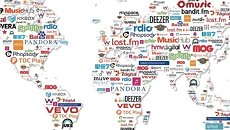Tuesday, January 24th 2012

In Wake Of SOPA Defeat and Rising Profits, IFPI Calls For 'SOPA Plus' Migraine Tablet
Yes, that's right, SOPA might have been set back for now, but the vested interests from the big media corporations (music/movies/news etc) that want it implemented unsurprisingly aren't sitting idle and are pushing for ever more draconian measures aka 'SOPA Plus'. A digital music report (PDF) asks for everything that was in the original SOPA and then some, with a wishlist of seven 'fixes':
"With a healthy 8 per cent increase in our digital revenues in 2011-the first time the annual growth rate has risen since records began in 2004-some might feel tempted to say that a troubled era for the music industry is coming to an end. Such complacency now, however, would be a great mistake. The truth is that record companies are building a successful digital music business in spite of the environment in which they operate, not because of it."
No, the truth is that these big media corporations are greedy and corrupt, along with their sock puppet governments that they control, as MPAA CEO, Chris Dodd recently demonstrated in arrogant and graphic detail when he said on Fox News:
"Those who count on quote 'Hollywood' for support need to understand that this industry is watching very carefully who's going to stand up for them when their job is at stake. Don't ask me to write a check for you when you think your job is at risk and then don't pay any attention to me when my job is at stake."
This has caused quite a stir and unsurprisingly, news about this went viral. Now, a White House petition has been set up to investigate him and the MPAA for bribery and corruption. The petition can be accessed here.
The graphic shows the distribution of legal services, according to IFPI.
There's more analysis on this story over at Ars Technica.
- Three strikes schemes aka 'graduated response'. Users identified (in what reliable way?) as repeat infringers, will get three warning notices from their ISP and then be cut off from the internet. Presumably, this will include a blacklist, so that they can't sign up for any other ISP either
- Site blocking. At the media industry say-so, any website on the planet can be blocked over mere allegations of piracy. An example of this already happening is www.newzbin.com, which is now blocked by British Telecom in the UK after being ordered to do so by the court. Attempting to view it now simply shows "Error - site blocked". Nice. BT can't even be bothered to show a template web page explaining the circumstances of this censorship. The report claims: "Site blocking is effective in dealing with the various new forms of infringement such as cyberlockers and websites. However, an approach based exclusively on website blocking is insufficient by itself, given the importance of major P2P services that are decentralised and therefore not covered by blocking"
- Search engines "need help". It's not enough that search engines like Google remove links to infringing content in order to stay on the right side of the DMCA, but now need to prioritize their links too according to the legality of the content: "A basic measure such as this would help consumers not only avoid viruses and malware, but also being directed unwittingly towards content piracy."
- Payment processors should cut off pirates voluntarily. The idea is to have companies like MasterCard and Visa unilaterally take action against infringing websites and stop payments from reaching them. In return, they get immunity from prosecution by the content industry by doing so
- Advertising networks cut off funds to pirate sites by stopping business with them, or they will get sued too
- Mobile operators are not exempt. 'Piracy' happens over mobile phones, laptops with wireless connections, iPads etc as well as the traditional wired internet connection. Therefore, mobile operators are expected to perform similar duties as their wired counterparts
- Keep suing the big sites. The report claims that litigation has played its part in the US recovery, pointing to the closure of Limewire. It claims that P2P piracy fell from 16% in the fourth quarter of 2007, to 9% in the fourth quarter of 2010 when Limewire stopped operating.
"With a healthy 8 per cent increase in our digital revenues in 2011-the first time the annual growth rate has risen since records began in 2004-some might feel tempted to say that a troubled era for the music industry is coming to an end. Such complacency now, however, would be a great mistake. The truth is that record companies are building a successful digital music business in spite of the environment in which they operate, not because of it."
No, the truth is that these big media corporations are greedy and corrupt, along with their sock puppet governments that they control, as MPAA CEO, Chris Dodd recently demonstrated in arrogant and graphic detail when he said on Fox News:
"Those who count on quote 'Hollywood' for support need to understand that this industry is watching very carefully who's going to stand up for them when their job is at stake. Don't ask me to write a check for you when you think your job is at risk and then don't pay any attention to me when my job is at stake."
This has caused quite a stir and unsurprisingly, news about this went viral. Now, a White House petition has been set up to investigate him and the MPAA for bribery and corruption. The petition can be accessed here.
The graphic shows the distribution of legal services, according to IFPI.
There's more analysis on this story over at Ars Technica.

51 Comments on In Wake Of SOPA Defeat and Rising Profits, IFPI Calls For 'SOPA Plus' Migraine Tablet